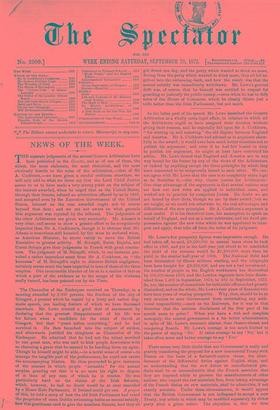NEWS OF THE WEEK.
THE seliarate judgments of the several Geneva Arbitrators have been published in the Gazette, and as of one of these, the ablest, the most elaborate, the most rhetorical, and the most -obviously hostile to the rules of the arbitration,—that of Sir A. Cockburn,—we have given a careful criticism elsewhere, we will only add to what we there say that the Lord Chief Justice seems to us to have made a very strong point on the subject of the interest awarded, when he urged that as the United States, through their Senate, refused an arbitration offered by us in 1869, and accepted even by the Executive Government of the United 'States, interest on the sum awarded ought not to accrue beyond that date; and we are not aware on what grounds this argument was rejected by the tribunal. The judgments of the other Arbitrators are given very succinctly. Mr. Adams's is very clear, and seems to show a greater effort to be scrupulously impartial than Sir A. Cockburn's, though it is obvious that Mr. Adams is sometimes still haunted by the woes he endured when, as American Minister, he strove vainly to move the British Executive to greater activity. M. Stiimpfli, Baron Itajuba, and Uount Sclopis give their judgments in French with great concise- mess. The judgment of M. Stitimpfli, which, in one instance, pro- voked a rather imprudent sneer from Sir A. Cockburn, on "the leennesa" of M. Stiimpfli's sight to discover British negligence, certainly seems much the least impartial in tone of those of the three umpires. One inexcusable blunder of his as to a matter of fact on -which a part of the evidence as to the escape of the Alabama really turned, has been pointed out by the Times.


































